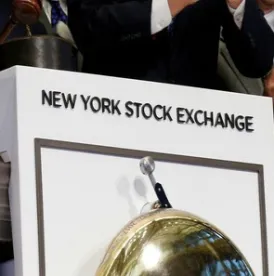The New York Stock Exchange (NYSE) and The Nasdaq Stock Market LLC (Nasdaq) both took action this month to provide issuers with much needed relief in response to the economic downturn caused by the COVID-19 pandemic. We expect that these measures will provide needed flexibility to many issuers, especially smaller reporting companies who have recently experienced significant stock price volatility and are in need of capital.
NYSE Partial Waiver of Shareholder Approval Rules for PIPE Financing
On April 6, 2020, the Securities and Exchange Commission approved a proposal from the New York Stock Exchange (NYSE) that partially waives continued listing rules that require shareholder approval for certain private investments in public equity (PIPE) transactions through June 30, 2020. In these times of market uncertainty, a PIPE transaction can be a quick and efficient way for a company to raise needed capital through the sale of equity securities in a private placement transaction.
Transactions of Twenty Percent or More – the “20% Rule”
Section 312.03(c) the NYSE Listed Company Manual requires shareholder approval prior to the issuance of common stock, or securities convertible into or exercisable for common stock, if (1) the common stock has, or will have upon issuance, equals or exceeds 20% of the voting power outstanding before the issuance of such stock; or (2) the number of shares of common stock to be issued is, or will be upon issuance, equal to or in excess of 20% of the number of shares of common stock outstanding before the transaction, other than a public offering for cash. This “20% Rule” is subject to exceptions, including “bona-fide private financings,” which require (i) that no purchaser acquire more than 5% of the issuer’s common stock or voting power; and (ii) the price of securities in the offering must not be lower than the lesser of the closing price of immediately prior to the offering or the average closing price for the five (5) trading days immediately prior to the offering.
The partial waiver provided by the NYSE removes the 5% investor limitation, effectively bringing the private financing exception to the 20% Rule in parity with Nasdaq rules. As a result, issuers will be able to raise capital in private transactions without the need for multiple investors as long as minimum price requirements are met as discussed above. The waiver also requires that such a transaction must be approved by a company’s audit committee comprised solely of independent directors.
Issuances to Related Parties
Section 312.03(b) of the NYSE Listed Company Manual requires shareholder approval of any issuance to a director, officer or 5% or greater security holder of more than 1% of either the total number of shares of common stock issued and outstanding or 1% of the voting power outstanding before the issuance. The NYSE Manual provides an exception for certain sales to related parties (except for officers and directors of the issuer) and their affiliates that meet a market price test which relates to no more than 5% of the issued and outstanding common stock of an issuer.
The partial waiver provided by the NYSE provides additional relief to issuers with respect to issuances to related parties, allowing sales to related parties – regardless of percentage issued – if the following requirements are met: (i) the sale price for the securities meet the minimum price requirements outlined above; (ii) the audit committee approves the transaction; and (iii) proceeds from the transaction will not be used to finance an acquisition of another company’s stock or assets in which the related party has a certain defined interest.
Nasdaq Relief for Bid Price and Market Value of Publicly Held Shares Continued Listing Requirements
On April 16, 2020, Nasdaq made a rule filing with the SEC providing temporary relief from its continued listing requirements concerning listing bid price and market value of publicly held shares. The Nasdaq rule change is effective through and including June 30, 2020.
If a company trades for thirty (30) consecutive business days below a $1.00 minimum closing bid price requirement, Nasdaq will send a deficiency notice to the company, advising that it has been granted a ”compliance period” of 180 calendar days to regain compliance. Companies listed on the Nasdaq Capital Market may be eligible for an additional period of 180 days in order to regain compliance if it meets the market value of publicly held shares requirement for continued listing and all other initial inclusion requirements for the Nasdaq Capital Market (except for the bid price) and provides written notice of its intention to cure the deficiency during the additional compliance period. Issuers listed on the Nasdaq Global Select Market or the Nasdaq Global Market may transfer to the Nasdaq Capital Market to avail themselves of the additional compliance period. An issuer regains compliance by satisfying the bid price requirement for a minimum of ten (10) consecutive days.
This Nasdaq rule change stops, or tolls, compliance with these bid price requirements through and including June 30, 2020. The relief has the effect of granting non-compliant issuers additional time to regain compliance. Importantly, Nasdaq will continue to monitor and provide a Rule 5810 notice to companies of non-compliance, however the 180-day period to regain compliance will not begin to run until July 1, 2020.
After the end of the tolling period, an issuer will be entitled to receive any remaining pending compliance periods after an official notice from Nasdaq is given. Similarly, issuers already involved in Nasdaq’s hearing process for non-compliance (where a determination has not yet been reached in such hearings) will return to the same status after the tolling period has expired.
As you are aware, things are changing quickly and the temporary relief and waiver measures and interpretations described here may change. This article represents our best understanding and interpretation based on where things currently stand.




 />i
/>i

